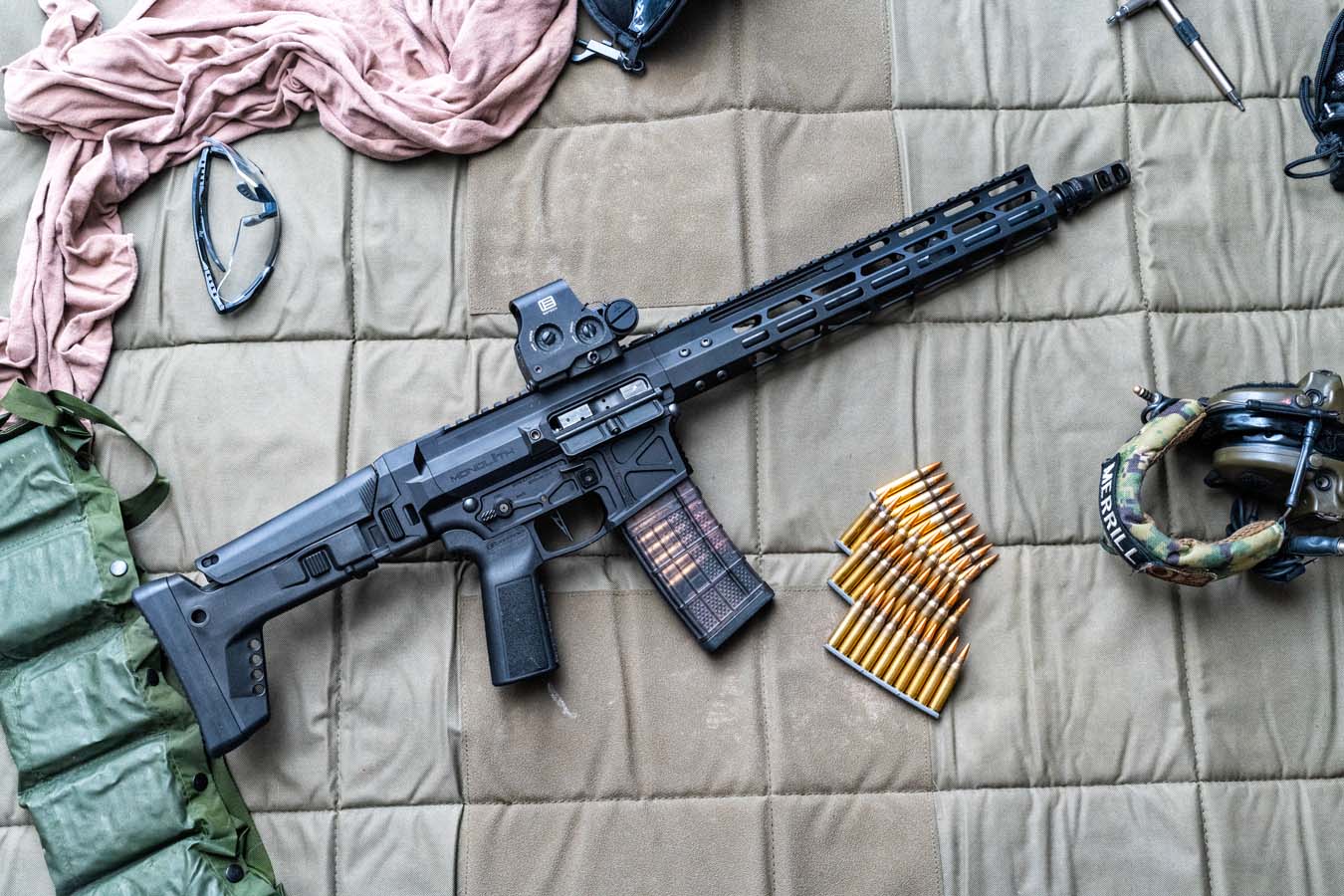Global Ordnance is an arms importer mostly known for bringing Eastern European shooters to American shores, but that isn’t all that they do. For the last couple years, they’ve been working with some American manufacturers to bring out their own unique models, and here’s the first: a 5.56 rifle named the Monolith.
Global Ordnance Monolith 5.56
- Caliber: 5.56mm
- Capacity: 30
- Barrel Length: 16.1 inches
- Overall Length: 24.5 inches (folded), 31.25 inches (open)
- Weight (unloaded): 5 pounds 10 ounces
- MSRP: $1,235
Even though it looks a lot like an AR-15 with a 16-inch 1:7 twist barrel and a continuous top-rail handguard, the Monolith is not an AR-15. It hits some of the same beats and shares some of the same parts, but it certainly isn’t from Stoner.
Lightweight at a touch over 5.5 pounds naked and easy to stow at 24.5 inches long when folded, the bufferless Monolith is quite a handy rifle.
Usually when the word “monolithic” is uttered regarding rifles, it’s in reference to the upper receiver and handguard being a single piece. But here, it’s about the barrel. Global Ordnance is machining the entire assembly from one piece of 41V50 steel. As in, the gas block and barrel extension and even the muzzle device are baked in right from the start.
This is a very complex operation but makes for an extremely high level of consistency. It’s a very strong assembly without additional weight, and furthermore the barrel is thermally fit to the upper receiver to maximize strength and rigidity. There’s no worry about gas block leakage from this mid-length system, and the barrel itself is svelte, a better match to a shorter pin-and-weld with its 16.1-inch all-in length.
With a modified direct-impingement action in the style of the legacy Z-M Weapons LR-300, the Monolith uses what amounts to a truncated AR bolt carrier group in order to contain a layered action spring inside the upper receiver so it can still be fired when folded. The bolt itself is beefy, with more reinforcement than an AR-15, and the cam pin design is quite refined.
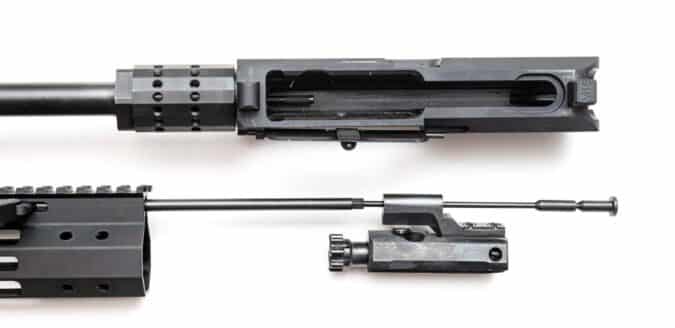
The ACR-style adjustable folding stock isn’t some cludgey add-on like so many others but is actually integral to the lower receiver. This makes for a compact, durable buttstock system. The Monolith comes complete with the upright P-Grip 23 from B5, though you can use any AR grip you’d like. The lower receiver itself is stylized with lightening cuts to both add an aesthetic touch and keep the weight down.
In terms of controls, the Monolith is like an advanced AR. It’s totally ambidextrous, with a mirrored fire selector, mag release, and bolt lock/release. The magazine release is square and generous. Those with small presidential hands might not be able to lock the bolt back with their trigger finger, but in a delightful quirk the open ejection port cover can be pressed down to release the bolt.
The non-reciprocating folding charging handle is housed inside the handguard and can swap sides or be changed out by removing a double-set screw from the front.
Though the Monolith isn’t an AR, there’s some level of parts compatibility. You can use any AR-15 trigger you’d like, and the same goes for the fire selector (a short-throw selector is in our near future). The firing pin and cotter pin inside the bolt carrier are also standard as is the pistol grip.
New designs can have some nuance, and the Monolith isn’t any different. It’s impossible for us not to notice the similarities between the Global Ordnance Monolith and the FM Products Mike-102 featured in RECOIL Issue 69 — because FM Products is involved with this project. However, the Monolith doesn’t have the same major issue of a must-often-be-replaced proprietary pin in the bolt carrier like the Mike.
More upper body strength is required to properly run the Monolith versus an AR. Because the action is now totally encompassed within the confines of the upper receiver, the bolt travel is short, and the spring is very stiff.
The strength required only increases as the bolt retracts. Unless you practice this first and ensure everything is lubed up, it’s not going to be a good time.
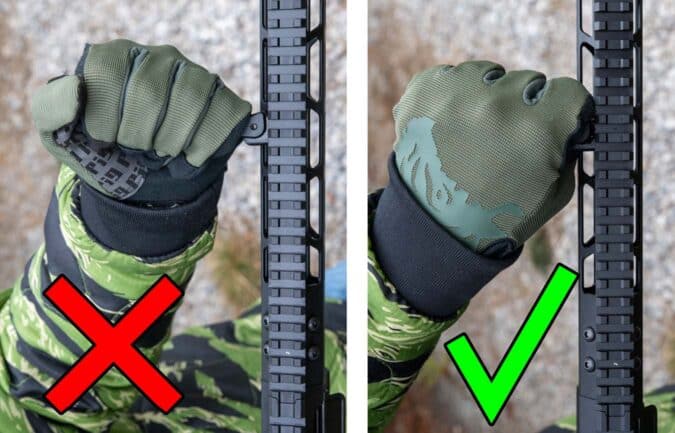
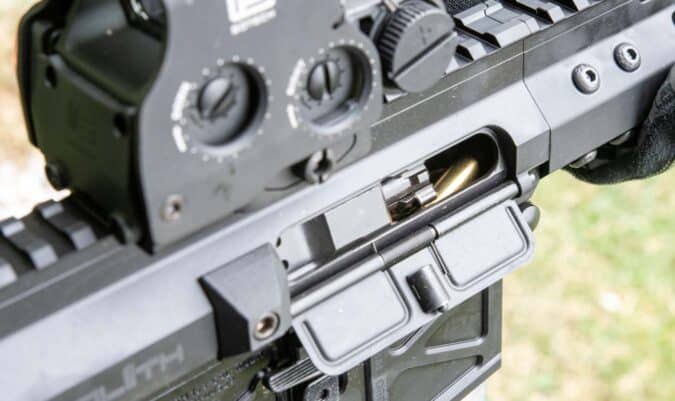
In order to not mess this up, you need to do it right: With the rifle against your shoulder, grab the charging handle close to the base and pull it swiftly and robustly straight back.
If you hold the handle too far outside, it can kink and friction freeze, especially toward the end of the cycle. This can make for a first-round misfeed when racking or allow the bolt lock to grab onto the front of the carrier and not the bolt face itself when manually locking back — this was very frustrating when combined with the frozen fingers of an outdoor range in winter. On our first range outing we managed to mangle many rounds before we figured this out.
Our recommendation is to manually lock the bolt back to the rear when loading up, especially the first few times before you get the hang of it. Once you’re using live rounds to run the bolt, it cycles smoothly. The recoil of the Monolith is decidedly different than an AR-15. The snap of the lighter weight bolt carrier assembly inside the smaller space is quelled by the muzzle brake, but the muzzle brake is quite loud.
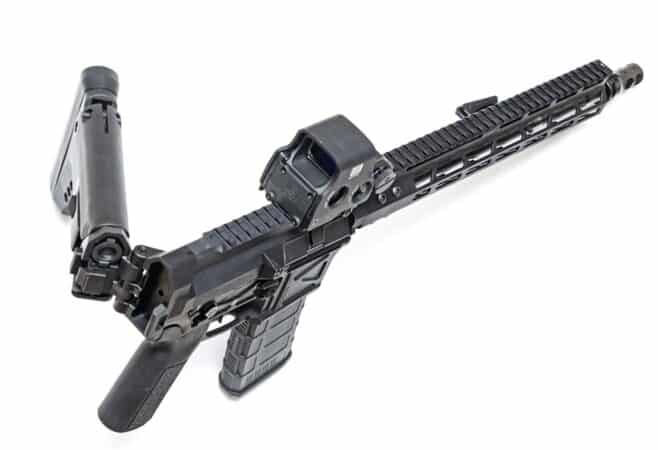
Even though the Dead Air KeyMo mount is integral to the muzzle, you still have some options because of the number of compatible devices. If you’re shooting indoors, you definitely want a Dead Air suppressor or at least a KeyMo linear compensator, lest you rattle your teeth out.
The magwell accepted every magazine offered, though we had some problems with a few polymer models not dropping free.
The charging handle channel needs to stay well lubricated and will likely smooth out with time and use. While a longer folding charging handle seems to be the more-premium option, a short-and-simple straight pull would be harder to kink on the way back, and indeed we like the one that came with the similar Mike-102 over the Monolith.
It’s not hard to see what the immediate future of the monolith may be. At the time of writing, the Monolith is available with either a 16.1- or 12.5-inch barrel, and we expect more of the same but in different calibers. The Russian 7.62×39 is mentioned many times in the assorted marketing material for the Monolith, so that’s a safe bet.
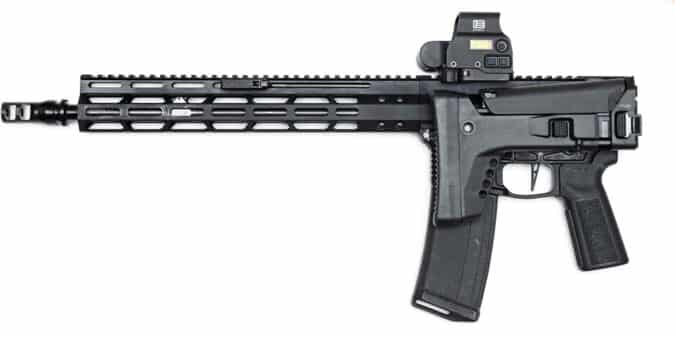

We’d like to see more charging handle options like a fixed or fully ambidextrous. We can’t help but think the addition of a slippery, tough finish like nDLC would ease many of our issues without a redesign as well as make the rifle more-premium overall.
The monolithic barrel system is a piece of excellent engineering, but integrating only a Dead Air device limits the market; a Monolith with a threaded barrel up front for additional muzzle device and silencer selection seems obvious. We also wouldn’t be surprised to see the same monolithic barrel technology used for a standard AR-15 system either.
It would’ve been dog-easy for Global Ordnance to merely make a boring AR-15 for their first foray — that or the definitely-not-a-Glock Glock clone that everyone else is doing. Instead, we got a multi-company American passion project that pairs some things we’ve seen before with some actual engineering improvements and innovation.
If it’s not going to be perfect, then it better damned well be interesting. And the Monolith gets more and more interesting the deeper you look. We look forward to more.
Read the full article here

